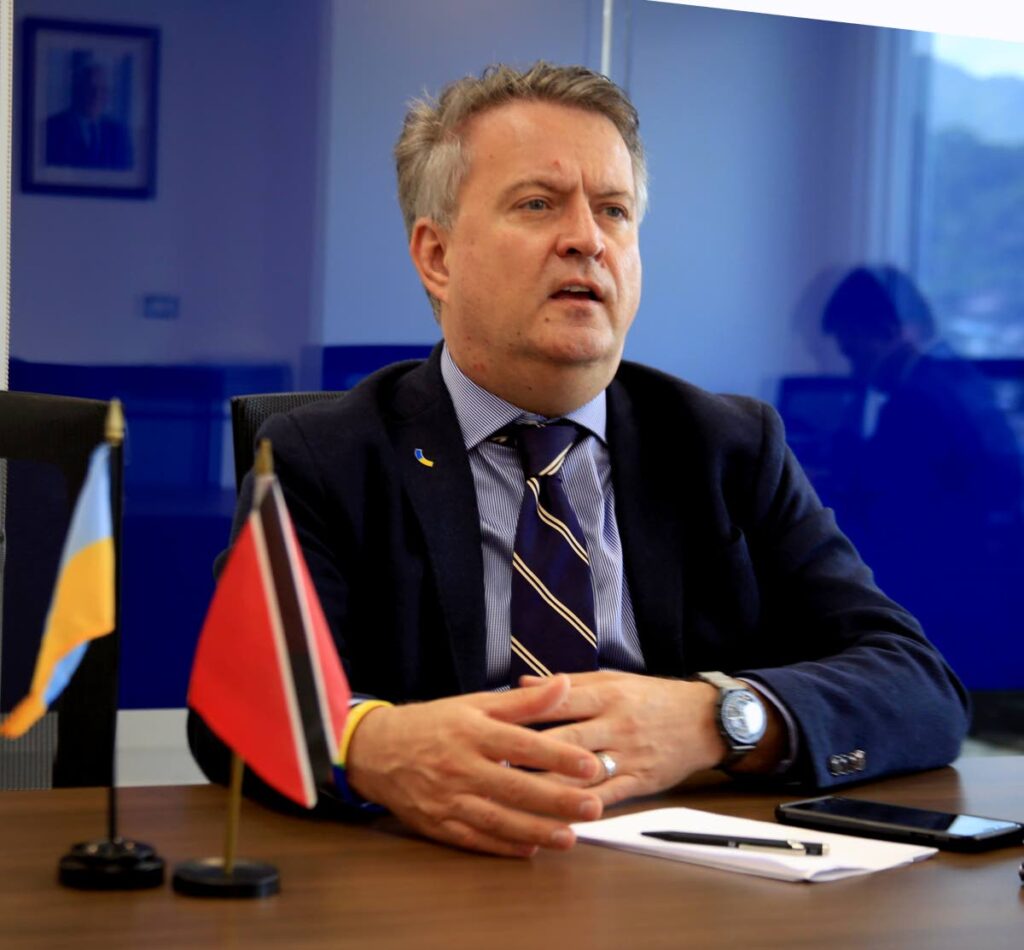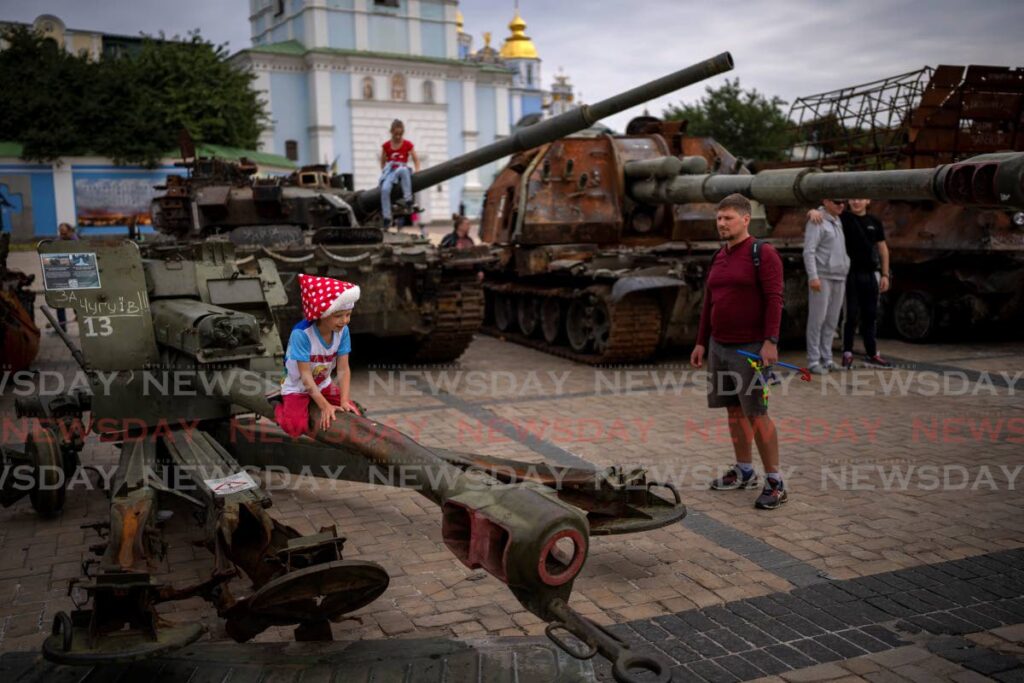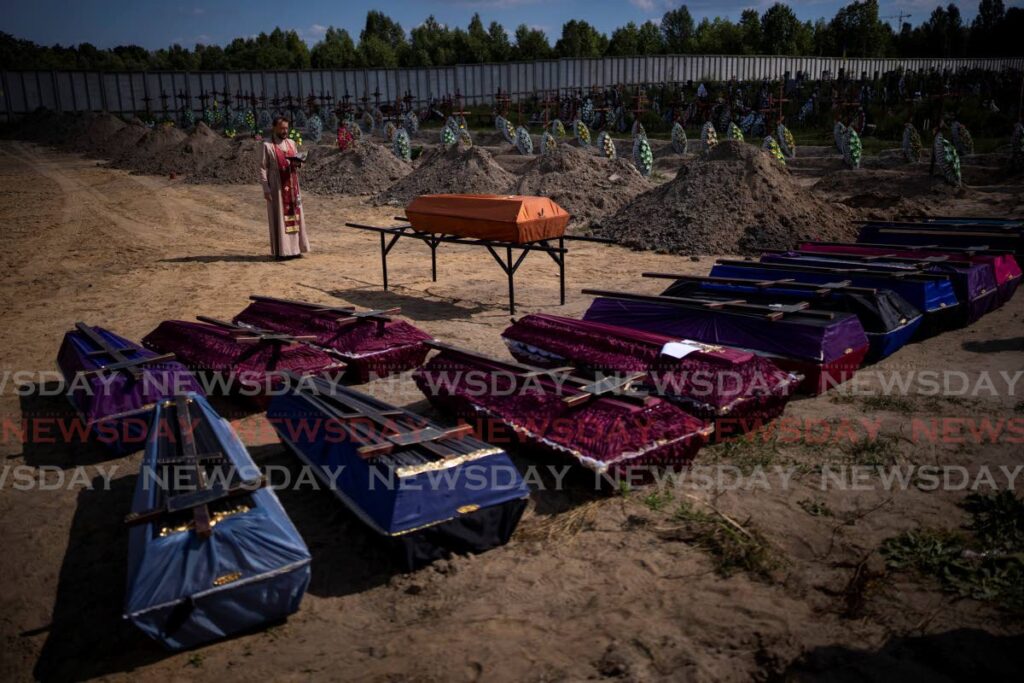Ukraine ambassador to Trinidad and Tobago: Putin's war an 'aggression on peace-loving' nations

As Trinidad and Tobago was celebrating its 60th anniversary of independence, the people of Ukraine were undergoing its sixth month of its independence being attacked. Russia invaded Ukraine on February 24.
Sergiy Kyslytsya, permanent representative of Ukraine to the UN and ambassador of Ukraine to TT (non-resident), said the scale of destruction in Ukraine during this war surpassed the level of World War II. Then, 20,000 citizens of Mariupol, Ukraine were killed, but by the end of spring 2022, over 30,000 had been killed there. In addition, other cities have been or are being destroyed.
In an interview with Sunday Newsday at the Delegation of the European Union to TT, Queen's Park East, Port of Spain, Kyslytsya congratulated TT on its 60th year of independence.
“Independence matters a lot to your country as much as it matters to my country. Ukraine was struggling for independence for centuries. We were incorporated in the Russian empire in the 17th century, and until this century it was non-stop aspiration by the Ukranian nation to become independent.
“The tragic irony is that, this year, on the day of independence, August 24, we also marked exactly six months of the full-scale aggression and invasion of Ukraine.”
Ukraine became independent from the Soviet Union in 1991.
He said Russia's war against Ukraine actually started in February 2017, when Russia moved into Crimea, which was internationally recognised as part of Ukraine, tried to illegally annex it, and initiated war in the east of Ukraine.
He said the international reaction to the war in 2022 was very different from the reaction in 2014.
In 2014, 100 nations supported the UN General Assembly resolution on the territorial integrity of Ukraine. On March 2, 2022, 148 countries voted in favour of the resolution that condemned the Russian aggression, while Syria, Belarus, North Korea, and Eritrea supported Russia.

“This aggression is seen as aggression on the entire peace-loving, democratic and law-abiding community. Because it is the most egregious violation of the UN Charter since the end of World War II and, in fact, since the creation of the UN.”
Kyslytsya expressed gratitude that TT's leadership chose to uphold the UN’s Charter and support Ukraine, saying it should be proud to be a member of the international community. He said TT should not underestimate the importance of its vote, because, even though it was a small nation, size did not matter in the UN General Assembly. Each country had a vote that counted.
“When you vote for the defence of the UN Charter and the principles and objectives, you vote for the environment, on the global scale, that will allow you and all other countries to deal with other challenges. Because it is a matter of fact that the current war distracts so much effort and resources – financial and human – from dealing with other pending issues on a global scale.”
He used climate change, the energy crisis and food shortages as examples. He pointed out that small countries, especially island nations, contributed minimally to climate change, yet they were some of the most affected.
He said development depended on the collective action of those who contributed most to climate change. But instead of focusing on plans to combat it, some countries were dealing with food shortages or trying to maintain a supply of energy, putting climate change on the back burner.
Some countries returned to coal mining and using coal for energy, when coal puts out the most carbon dioxide per unit of energy and is the single largest source of global temperature rise contributing to climate change.
Energy shortages also increased the cost of production and therefore import costs.
The world’s energy issues were exacerbated when gas exports from Russia – the biggest oil and natural gas exporter – were curtailed in an attempt to limit its ability to finance the war in Ukraine.
Also, the two countries exported about 24 per cent of the world’s wheat, so, between the war in Ukraine and sanctions against Russia, there was less supply, resulting in increased food prices globally.
All of this has affected every citizen of TT, from doing business to buying groceries.
Joining the EU and NATO
Kyslytsya said over 160 countries, including Ukraine, could not defend themselves on their own strength.
He said the global solution, the UN, did not prevent the war because the Russian Federation, along with China, France, the UK and the US, is a permanent member on the 15-member UN Security Council. And permanent members could veto issues, which was what Russia did with respect to Ukraine.

Therefore, Ukraine had to turn to a regional solution, the North Atlantic Treaty Organization (NATO). It also applied for membership of the European Union (EU) shortly after it was invaded by Russia, and the European Council granted it candidate status in June.
Kyslytsya dismissed Russian President Vladimir Putin’s reasons for invading his country.
He said before the war, Putin wanted to prevent NATO from expanding. But his invasion led Finland and Sweden, known throughout the years for remaining neutral on international armed conflicts, to formally apply to join NATO.
Also, Putin said he did not want to have “more NATO” at Russia’s borders, but Ukraine’s borders were shared by other NATO countries. If Russia took over the country, the exact opposite would be the case.
“No matter the grievances, launching a full-scale war is not the reply. So Ukraine should not be blamed for a war solution. It is Russia who launched this unjustified and unprovoked war.”
He added that Russia could not offer Ukraine anything, as it had “no rule of law,” no new technologies and was “economically backward.”
As an example, he said Russia’s contribution to the UN Regular Budget was less than two per cent compared to the US’s, which was capped at 22 per cent. Among other things, the budget contributions were based on each country’s gross national income, indicating that Russia was not as financially well off as it purports.
“The Russian Federation, that has this incredibly large territory, they used to tell all of us, ‘You should be afraid of us because we have the second strongest army,’ which proved to be a lie. They contribute to the budget of the entire organisation less than two per cent and they still try to dictate all of us and how we should live.”
Kyslytsya said credible evidence of Putin’s war crimes and crimes against humanity was being collected by countries and organisations including the International Criminal Court (ICC). He said the ICC had a team working on collecting the data and preserving the evidence of the war, and satellite imagery meant Putin could not hide his actions.
“What happens today is a result of three decades of complacency and turning a blind eye (to) what Russia was doing. Because every time Russia would do something, we, including Ukraine, would express our concern and then go back to business as usual. So we led Putin to the point where he was quite confidently believing that, no matter what he does, we’ll be initially unhappy and then we would continue to operate as usual.
“That is why one of the most important things is the issue of accountability and fighting impunity.”
He noted that the Group of Friends (GoF) of Accountability, consisting of about 50 countries, was formed to ensure accountability for international crimes committed by Russia in Ukraine. And fighting impunity was important for all. since there were many conflicts around the world in which thousands of people were being killed.
When the war is over, Kyslytsya hopes to continue discussions with TT on “mutually complementary” topics.
He said he met Minister of Foreign and Caricom Affairs Dr Amery Browne for the first time in October 2021 and was impressed by his “clarity of thought” and common-sense approach.
“Then we had quite a list of things that, in spite of being geographically far away from each other, we could have developed.”
That included the agricultural sector, IT, and digitalisation. Unfortunately, because of the invasion, those matters were put on hold until the war was over. Then, he said, the needs and interests of the people in Ukraine could be identified and the two countries could see what TT could provide.
He added that he was sorry Ukraine could not afford a permanent presence in TT and hoped TT could be elected to the UN General Assembly in the future.

Comments
"Ukraine ambassador to Trinidad and Tobago: Putin’s war an ‘aggression on peace-loving’ nations"